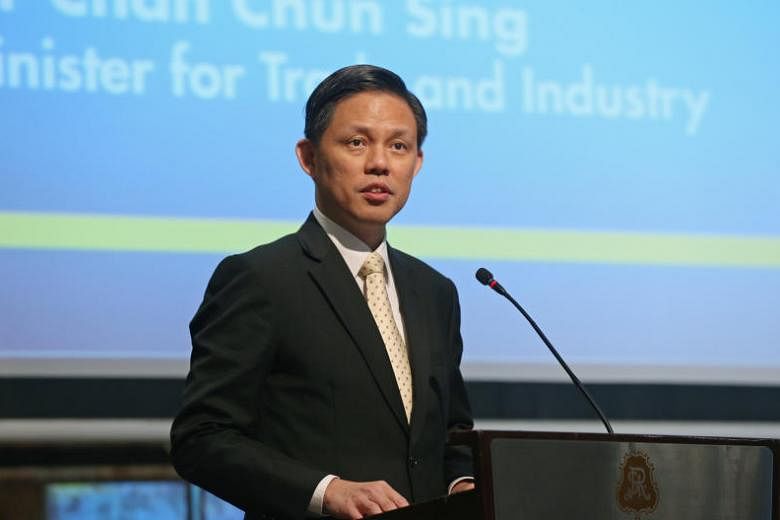SINGAPORE - The trade conflict between the United States and China will not blow over quickly, as it is driven by fundamental shifts in their domestic politics and economies, Minister for Trade and Industry Chan Chun Sing told about 250 American and international business leaders on Tuesday (Aug 14).
He urged the businessmen to make a stand for a rules-based multilateral trading system and to continue investing in the region to set the pace for Washington, at the lunch discussion organised by the American Chamber of Commerce in Singapore.
"Politics follows economics. You are the leaders of economics... the choices you make individually will inform Washington where their priorities go," said the minister.
Mr Chan spoke for 1½ hours on the future of the US-Singapore relationship and the role of foreign investment, fielding questions from the American business community on how Singapore was affected by and responding to the recent streak of protectionism in the US.
Like Mr Chan, most of the business leaders reckoned that the trade tensions were unlikely to vanish after the US mid-term elections in November or even after a change in leadership, because of fundamental shifts in both the US and China.
For the US, the shift was a domestic backlash against globalisation and politicians tackling the issue of how to better distribute its benefits, he said.
The fact that both the Republican and Democrat candidates felt the need to repudiate the Trans-Pacific Partnership (TPP) towards the end of the 2016 US presidential campaign attested to the strength of this domestic sentiment, said Mr Chan.
China changed dramatically since joining the global trading system 20 years ago and has to grapple with the responsibilities expected of an economic superpower, he said
"The two giants will determine the fate of not just their domestic economies and systems, but also the trajectory the world will go in," he said.
Singapore and South-east Asia are closely watching how the US carries out its Indo-Pacific strategy, particularly the US$113 million (S$155 million) economic programmes and US$300 million security cooperation schemes announced recently to deepen US engagement in the region.
"If countries are unable to find certainty in a particular course of action, they'll calculate and come to their own conclusions on what they should do," said Mr Chan.
Singapore is responding to the trade conflict by working to boost its speed of innovation and diversifying its markets, he said.
He hoped that the European Union-Singapore free trade agreement could be signed, and that substantive negotiations on the Asean-led Regional Comprehensive Economic Partnership trade pact be concluded, by this year.
He also hoped the revised TPP, which Singapore is part of but which the Trump administration pulled out from, can come into force in the early part of 2019.
But Mr Chan acknowledged that Singapore may not have felt the full impact of the trade conflict yet.
"These are still the early days and many of you are still in a wait-and-see mode. You may have perhaps held back some of your investments, but in short term are unable to make significant shifts in your investment pattern," Mr Chan said.
The worst impact of a sustained trade conflict would be the global loss of confidence in investment and financial markets, he said.
Mr Chan added that, to counter this, Singapore - together with like-minded countries and companies - will keep making a stand for the global multilateral rules-based system.
He urged the business leaders, whom he called the movers and shakers of businesses in the region, to exercise their clout, as their choice of where to invest "will cumulatively build up a picture of what the US stands for in this region".
He said: "It's not just you following Washington. It's also where Washington follows you because of your individual decisions which add up."
McLarty Associates senior adviser Steven Okun, who attended the event, told The Straits Times: "One of the reasons so many US companies headquarter here is Singapore's engagement and leadership in free trade agreements."
"As companies based in Singapore, we look forward to working with the Ministry of Trade and Industry as the Comprehensive and Progressive Agreement for Trans-Pacific Partnership goes into effect so that the benefits of the agreement can be fully realised," added Mr Okun, who chairs AmCham Singapore's TPP task force.


